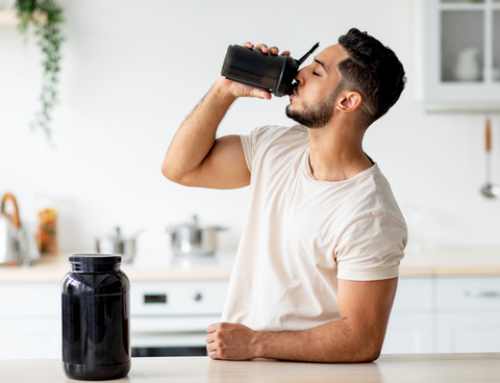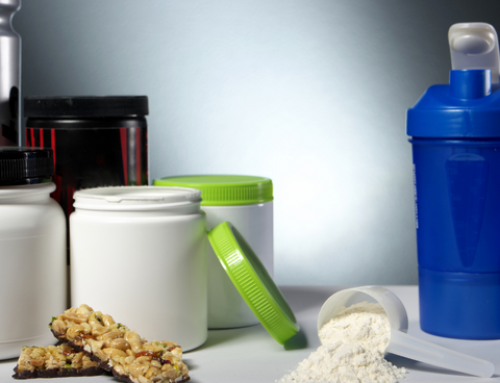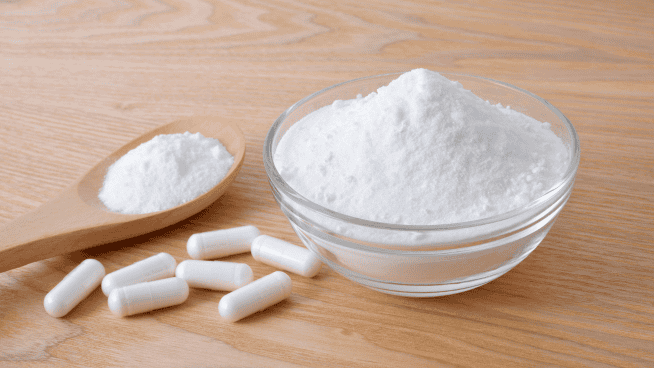3 Ways Caffeine Improves Your Sports Performance
![]()
If you drink coffee, you are very familiar with how caffeine can improve your energy and mental focus. Put simply, caffeine works fantastically—which is why Americans drink an average of 2.1 cups of coffee per day.
However, caffeine consumption has other potential benefits beyond making you feel more awake and alert. Specifically, there’s promising research that caffeine can actually improve your workouts and sports performance.
The July issue of the Journal of Strength & Conditioning Research includes three separate studies that examined the potential benefits of caffeine.
RELATED: 4 Creatine Myths Exposed
Caffeine’s Effects on Vertical Jump Height
Twenty-five NCAA Division I athletes performed a Squat Jump and Countermovement Jump after consuming either 5 mg/kg of caffeine or a placebo. Vertical jump performance increased by 5.4 percent and countermovement jump increased by 4.3%. It’s thought that caffeine increases jump height by allowing muscles to contract faster and more powerfully.
Caffeine’s Effects on Strength
Fifteen subjects performed three tests after consuming a caffeinated energy drink, a non-caffeinated energy drink or a placebo. Maximum voluntary muscle contraction, a fancy term for a measure of strength, increased by about 5 percent when the subjects consumed caffeine. Electrical activation of the muscle didn’t change; it was concluded that caffeine may increase strength, but not by much.
Caffeine’s Effects on Fat Loss
Twelve subjects performed a sprint interval session after consuming either caffeine or a placebo. Energy expenditure increased by about 8 percent at rest and over 10 percent after the caffeinated workout was finished, compared to the placebo. Endurance capacity increased by about 10 percent, as did fat burn rates. Basically, taking caffeine before a workout causes you to burn more calories, burn more fat and perform at a higher level.
Should You Supplement With Caffeine to Improve Performance?

Many athletes already supplement with caffeine, whether they drink a cup of coffee or take a pre-workout supplement, which typically contains moderate to high levels of caffeine.
Even the NCAA, which is notoriously strict on supplements, details benefits of caffeine, including:
- Allows for high training intensities and longer workouts due to reduced perceived fatigue.
- Improves performance in high-intensity sports where consecutive bouts of effort last longer than 90 seconds.
- Improves focus, coordination and concentration.
- Performance effects of caffeine may last up to four hours.
That said, caffeine is restricted by the NCAA because it’s addictive and can cause dehydration, nausea, shaking, overstimulation and other issues that impair performance, not improve it.
NCAA athletes are allowed 500 milligrams of caffeine per day, which is equivalent to about 6-8 cups of coffee. You’d be hard pressed to drink that much coffee in a single day; however, energy drinks, caffeine pills and some pre-workout supplements can put you close to that threshold if you’re not careful.
A good guideline is to stick with coffee or supplements that clearly label caffeine quantities per serving—ideally, the supplement is NSF-certified so you can be sure that the amount of caffeine listed is accurate. You might not be a collegiate athlete, but it’s wise to keep this limit in mind.
Also, not everyone responds to caffeine the same way. Some people hardly feel its effects, whereas others become easily overstimulated. That’s why it’s important to test what works for you and don’t suddenly load up on caffeine before a big game. I saw a former teammate make this mistake and he had his worst game of the season because he was so jittery.
And remember, caffeine is a diuretic, meaning it causes you to go to the bathroom more frequently, which ultimately reduces the amount of fluids in your body. If you do decide to supplement with caffeine, make sure to drink plenty of fluids, —and no, energy drinks don’t count as fluids.
RELATED: Safe Muscle-Building Supplements That Actually Work
RECOMMENDED FOR YOU
MOST POPULAR
3 Ways Caffeine Improves Your Sports Performance
![]()
If you drink coffee, you are very familiar with how caffeine can improve your energy and mental focus. Put simply, caffeine works fantastically—which is why Americans drink an average of 2.1 cups of coffee per day.
However, caffeine consumption has other potential benefits beyond making you feel more awake and alert. Specifically, there’s promising research that caffeine can actually improve your workouts and sports performance.
The July issue of the Journal of Strength & Conditioning Research includes three separate studies that examined the potential benefits of caffeine.
RELATED: 4 Creatine Myths Exposed
Caffeine’s Effects on Vertical Jump Height
Twenty-five NCAA Division I athletes performed a Squat Jump and Countermovement Jump after consuming either 5 mg/kg of caffeine or a placebo. Vertical jump performance increased by 5.4 percent and countermovement jump increased by 4.3%. It’s thought that caffeine increases jump height by allowing muscles to contract faster and more powerfully.
Caffeine’s Effects on Strength
Fifteen subjects performed three tests after consuming a caffeinated energy drink, a non-caffeinated energy drink or a placebo. Maximum voluntary muscle contraction, a fancy term for a measure of strength, increased by about 5 percent when the subjects consumed caffeine. Electrical activation of the muscle didn’t change; it was concluded that caffeine may increase strength, but not by much.
Caffeine’s Effects on Fat Loss
Twelve subjects performed a sprint interval session after consuming either caffeine or a placebo. Energy expenditure increased by about 8 percent at rest and over 10 percent after the caffeinated workout was finished, compared to the placebo. Endurance capacity increased by about 10 percent, as did fat burn rates. Basically, taking caffeine before a workout causes you to burn more calories, burn more fat and perform at a higher level.
Should You Supplement With Caffeine to Improve Performance?

Many athletes already supplement with caffeine, whether they drink a cup of coffee or take a pre-workout supplement, which typically contains moderate to high levels of caffeine.
Even the NCAA, which is notoriously strict on supplements, details benefits of caffeine, including:
- Allows for high training intensities and longer workouts due to reduced perceived fatigue.
- Improves performance in high-intensity sports where consecutive bouts of effort last longer than 90 seconds.
- Improves focus, coordination and concentration.
- Performance effects of caffeine may last up to four hours.
That said, caffeine is restricted by the NCAA because it’s addictive and can cause dehydration, nausea, shaking, overstimulation and other issues that impair performance, not improve it.
NCAA athletes are allowed 500 milligrams of caffeine per day, which is equivalent to about 6-8 cups of coffee. You’d be hard pressed to drink that much coffee in a single day; however, energy drinks, caffeine pills and some pre-workout supplements can put you close to that threshold if you’re not careful.
A good guideline is to stick with coffee or supplements that clearly label caffeine quantities per serving—ideally, the supplement is NSF-certified so you can be sure that the amount of caffeine listed is accurate. You might not be a collegiate athlete, but it’s wise to keep this limit in mind.
Also, not everyone responds to caffeine the same way. Some people hardly feel its effects, whereas others become easily overstimulated. That’s why it’s important to test what works for you and don’t suddenly load up on caffeine before a big game. I saw a former teammate make this mistake and he had his worst game of the season because he was so jittery.
And remember, caffeine is a diuretic, meaning it causes you to go to the bathroom more frequently, which ultimately reduces the amount of fluids in your body. If you do decide to supplement with caffeine, make sure to drink plenty of fluids, —and no, energy drinks don’t count as fluids.
RELATED: Safe Muscle-Building Supplements That Actually Work










